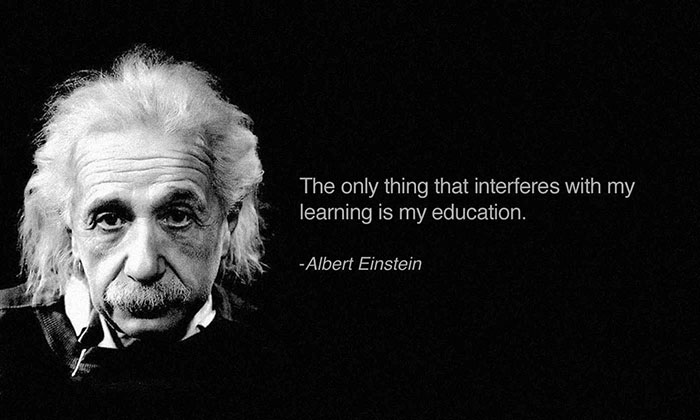I just went for a walk off downtown Fort Worth because it’s basically the second day of fall, and the weather is crisp and nice. (It’s a little bit closer to where I’m from, also known as New York City.) I hadn’t walked in this particular direction before, so I came across a monument to JFK — he spoke in Fort Worth in the days leading up to his death — and on the monument was a pretty cool quote:
“A man may die, nations may rise and fall, but an idea lives on.”
I liked that quote a lot — I wish more organizations understood it — so I came back and did some Googling around other Kennedy context and quotes and kind of went down a rabbit hole. I eventually came to the All Things Workplace blog and this post on Einstein. Here’s a quote from Einstein that I had never heard before:
“It’s impossible to detect the motion of a system by measurements made within the system.”
OK, cool.
When I was about 24, in the summer of 2005, I went and visited my cousin in Boston. I was living in CT at the time and working for ESPN, so it wasn’t like I took a cross-country flight or anything, but still. I had graduated from college maybe 23 months prior to this trip, so I knew essentially nothing. I had worked for Teach for America for two years, mostly failed upward, and was now living my dream job in central CT (or so I thought).
Going in, I knew my cousin was some type of consultant. It was a big deal in my family, for the most part. He was based in Boston but it seemed like he flew to Kansas City all the time for meetings, on some type of Sunday to Thursday schedule. The meetings were unclear — perhaps about pharma, perhaps about budgets — but because (as I mentioned) I knew nothing, I was confused about something: why would someone be based in Boston, but do the majority of their week’s work in Kansas City? That seemed illogical to me.
I spent the bulk of my interaction with my cousin over those 48 hours trying to figure out exactly what consultants do and why they exist. It eventually became overshadowed by the fact that he was subtly coming out of the closet to me, although like I said, I knew nothing at the time, so I kind of missed a lot of those cues. I never did completely find out what a consultant does, or what the justification for one is.
Since then — that was, after all, 10 years ago next summer — I’ve had a lot more friends become consultants, so I have a better understanding of the idea (at least generally). I still think a lot of organizations probably throw bad money at consultants because it’s hard to come in, clean up a process, and then have that process retain for months/years (look at Bar Rescue as a small example of that) — but I mostly get why the profession exists.
If you look at this Einstein quote, though — and undeniably Einstein is a far smarter person than I am — it starts to make a little more sense. When measurements are made within the system, you can’t actually detect any changes. Phrased another way: processes developed by people have, by definition, emotional connection for those people. So if they’re not working, the people will still try to defend them — perhaps out of fear that they could get sacked for being tied to a perceived-ineffective program. You have a tough time looking at what you create critically (I have that problem with this blog), so you often need an outside person to come in and give new perspective.
The same thing happens with editors, graphic artists, and all over the creative process.
The interesting flip side to this, though — could you make the same argument around Big Data? Oftentimes the concept of “Big Data” refers back to measurements made within the system, even if the observation points include customers. By that logic, can you possibly detect the motion of the organization via just that concept? Maybe not.
